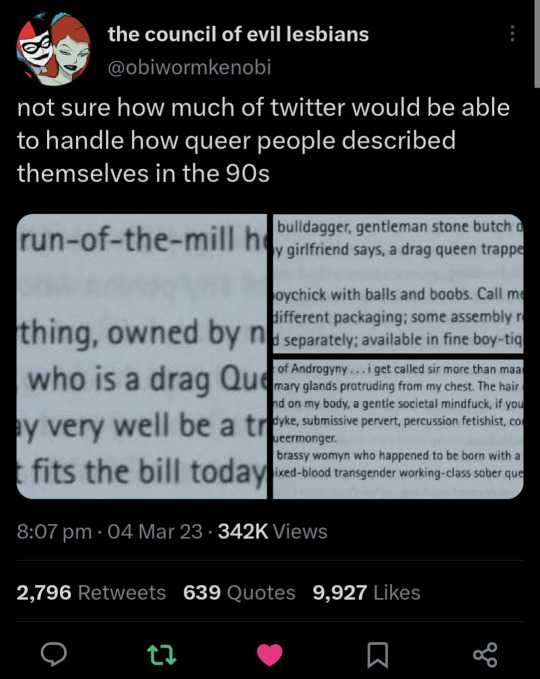Photo




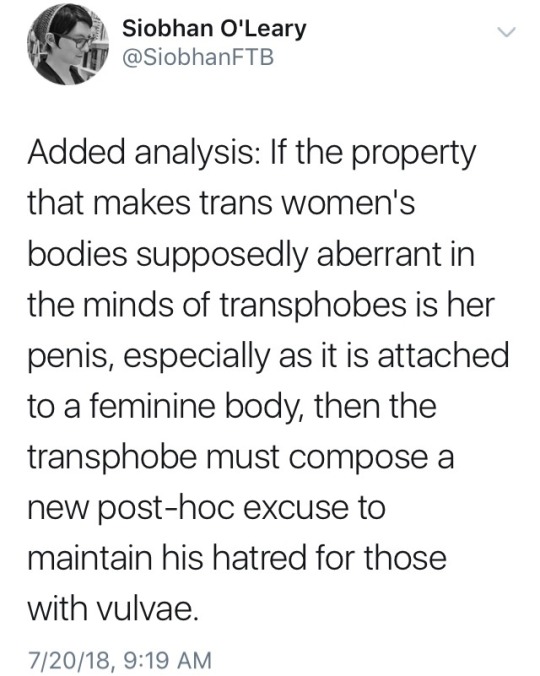
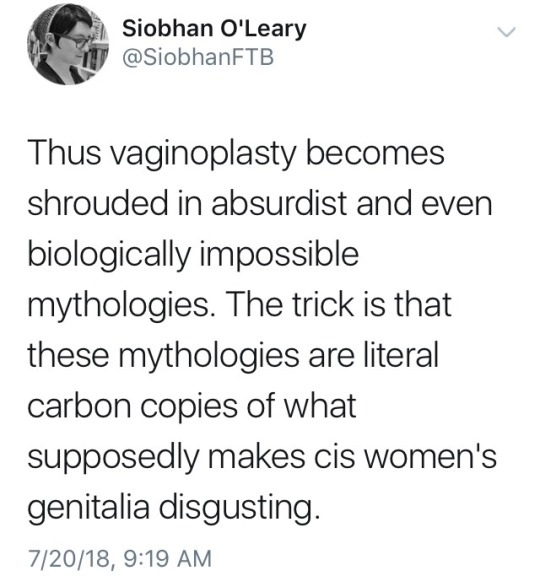
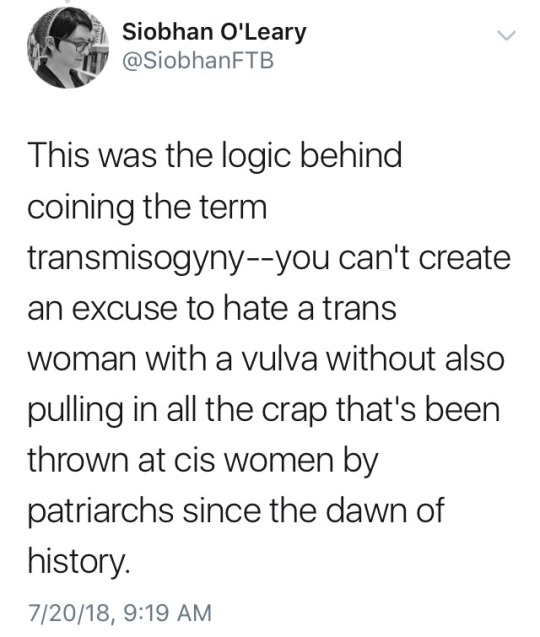
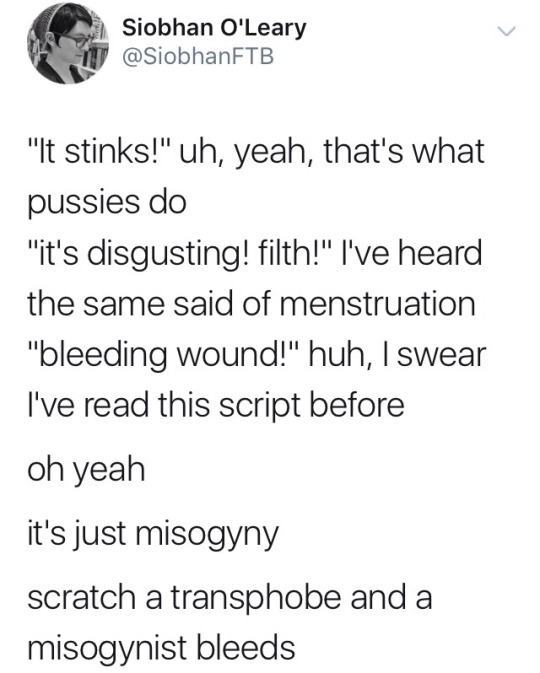
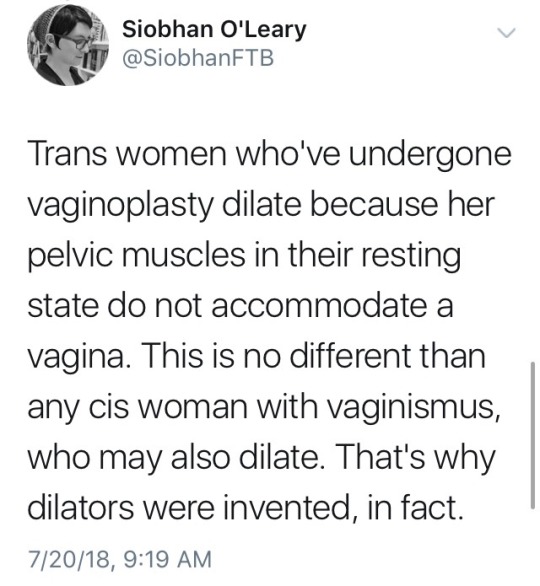

“scratch a transphobe and a misogynist bleeds”
siobhan o'leary gives us a brilliant deconstruction of transphobia, and transmisogyny specifically
Source: https://twitter.com/siobhanftb/status/1020309083423821825?s=21
48K notes
·
View notes
Text
the transandrophobia discourse is poisoned by separatist feminist theory that terfs and radfems have been maliciously injecting into feminist conversations, so here's The Will To Change excerpts by bell hooks again.
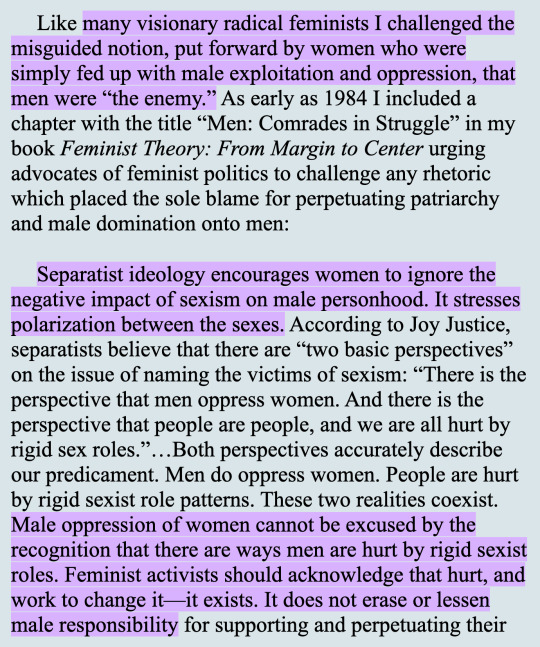
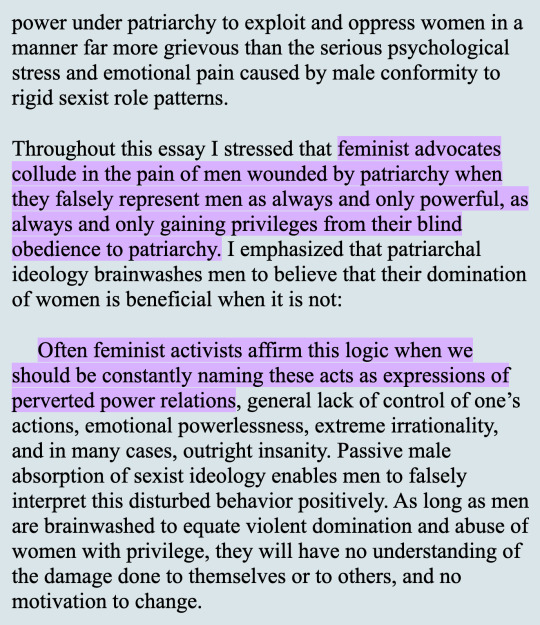



libratory feminism sees no difference between men and women except those manufactured by patriarchy. misogyny is a symptom of patriarchy the system, not a structure by which to interpret patriarchy the system. replacing "sexism" with "misogyny" does not change the nature of the analysis, which is a weak one. patriarchy the system can induce the symptom of misogyny in any person subjected to that system. using sexism/misogyny/male chauvinism is not a useful lens of analysis when looking at patriarchy because women are misogynists too. let's not move backward on that. women are misogynists too and men are allies.
the recent "trans men are misogynists" allegations I've seen lodged against trans men are:
unprepared to be treated like a predator, may cry about it
asked that only trans men attend a trans mens' support group
discussed male loneliness instead of talking about violence against women
all of these are actually feminist discussions. so the backlash seems like angry feminist reactions to Men Having Feelings, which is not a new thing. in fact, hooks addresses it directly.


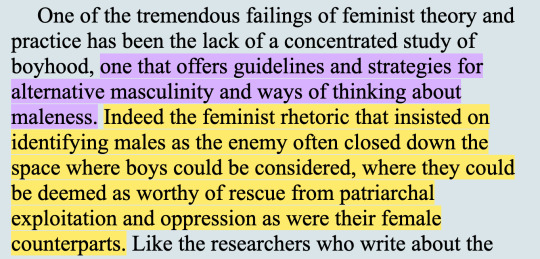
i see men being mocked for having their feelings hurt, men being mocked for wanting to discuss their feelings, and men being mocked because they're thinking about men and manhood in new and complex ways. exactly what the doctor ordered.
i am not seeing challenges to patriarchy here. I am seeing reinforcement of patriarchal expectations of masculinity on trans men who do not want to perform those expectations. i am seeing separatist radfem bullshit in the assumption that trans men have lost or never had a valuable perspective on misogyny or gender or sexism and cannot tell when the shape of discrimination they're facing has changed. i am seeing toxic separatist radfem bullshit shut down liberatory feminist discussion because one of the speakers is trans in the wrong direction.
2K notes
·
View notes
Text
the expectation is that you come out once as the exact thing you are and stay that way until you die— needing to come out a second or third time gets framed as a failure of intelligence and insight. those who were lucky enough or who played it safe enough to never need to come out a second time can stand on the outside and point fingers, they can psychoanalyze you and step into the most vulnerable parts of your sexual and emotional history to tell you exactly who you should have known you were at that stage in your life, but they have no frame of reference for the strength it took for you to keep looking.
#also like. even if you DONT have any of those complicating factors#which. lets face it. you absorb homo/transphobia even if you are very privileged and lucky and everyone immeidately around you is supportive#life is complicated!! life is messy!! we dont know everything about ourselves right away and sometimes it takes time to find things out#and if you come out as one thing and then it turns out you have to come out again later thats okay#why should you deny yourself completely just bc you might not knoe the whole deal yet?
474 notes
·
View notes
Text
Heroines by Kate Zambreno
Sometimes art comes to you at the exact moment that you need it. That was the case for me and Kate Zambreno's Heroines. This book blends scholarship with memoir (like so many of my favorites), giving life to the women of modernism. Some of these women are well-known in their own right, like Virginia Woolf. Others, like Zelda Fitzgerald, have been hidden in the shadow of their husband's work. Discussing their lives alongside her own struggles as a writer, Zambreno makes known the desire to find one's sovereignty through writing.
In a couple weeks it will have been five months since I graduated. I still don't have a job, although I've come close a couple of times. I'm frightened about what I'll do in another month when my grace period ends - my savings are only going to last me so long. But mostly, I have been afraid about my legitimacy as a writer. With no deadlines, no one making demands of me, I have wondered if I will be able to continue to write. What I have written has been sparse and incomplete. Mostly notes and ideas and scribbles in my notebook.
I've been a writer since I was in middle school, writing TMNT fan fiction on the Nickelodeon fan forums (remember when they still had those?). To no longer be a writer is my greatest existential threat. To no longer be a writer is to fall to pieces. Zambreno calls to the girl and women writers, and although I'm no longer either of those (at least not entirely), I felt she was calling to me as well. Reminding me that standard ideas of great literature came from the same people who pathologized Zelda for her writing. Who said that writing about the personal without fictionalizing was too messy, immodern, too feminine. I have never agreed with that mindset - why should I apply it to my own writing?
Zambreno's final call to her audience is to keep writing. To write in ways that are illegitimate, not accepted by the academy. The notebook, the diary, the blog. She calls to the audience to believe in their own genius. Think of the Great Men who were coddled and fussed over and allowed to pursue their art even before they were recognized for the minds they were. I can't do her justice, you simply must read the book yourself. If you are or ever have been a woman writer, I think you owe it to yourself. If you have felt that your writing is too messy, too personal, too illegitimate.
I can't tell you how this book has changed my life. But this is the first post on this blog in months. That has to count for something. I feel solidified for the first time. I am a writer. I will keep writing. I may be published years from now or never, but the only one who decides my status as a writer is me.
In the last pages of this book, Zambreno writes, "A new ritual I practice, as I get ready to write, I put on my new 4-inch platforms and stand in front of my floorlength mirror, sometimes as I'm eating chocolate almond-milk ice cream, and I intone to the mirror to myself: You're a fucking genius. Now you try it."
I think I will.
1 note
·
View note
Text
guys why the fuck aren't we talking about what's happening in the uk right now
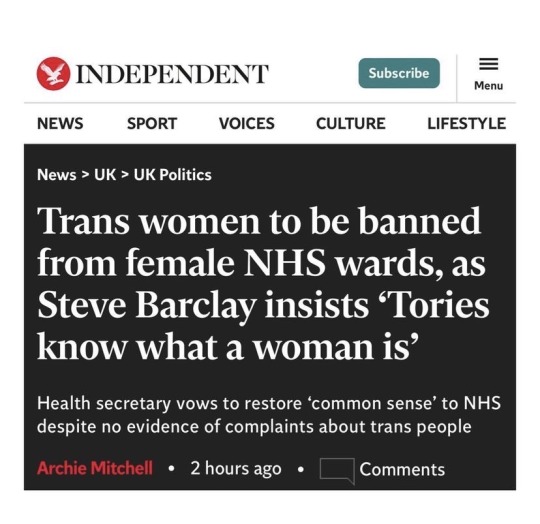
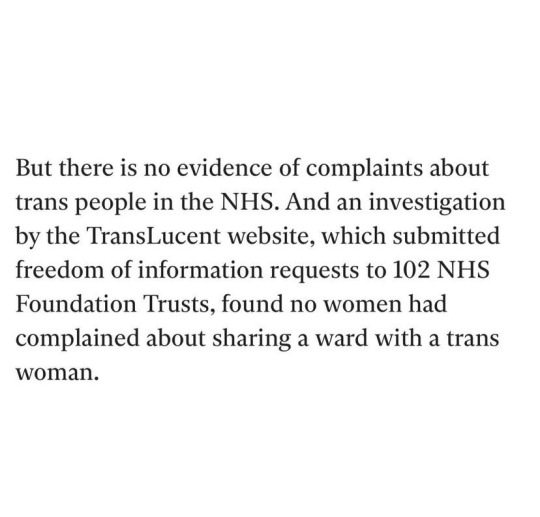
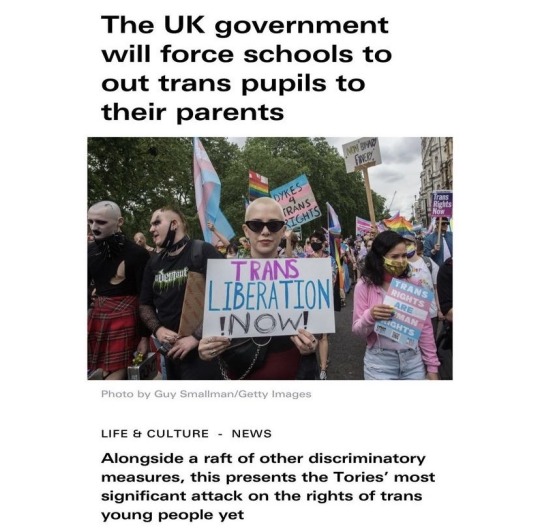
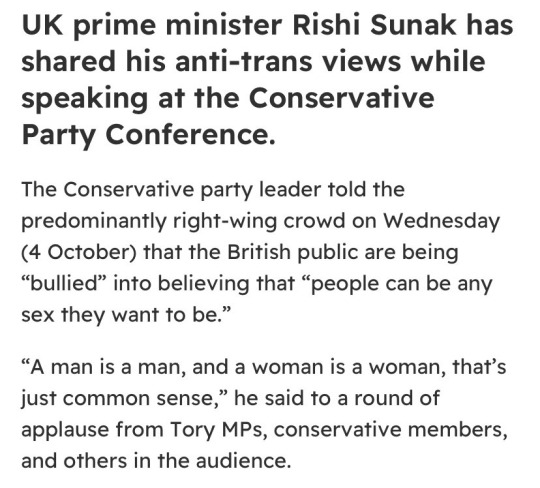
nobody outside the uk is talking about this. why is nobody talking about it
53K notes
·
View notes
Text
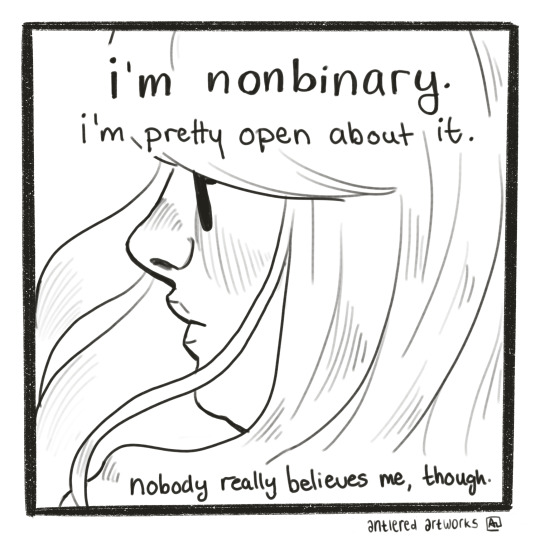
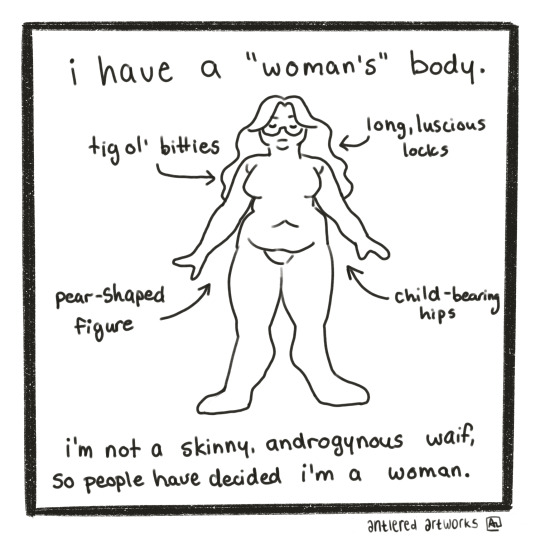
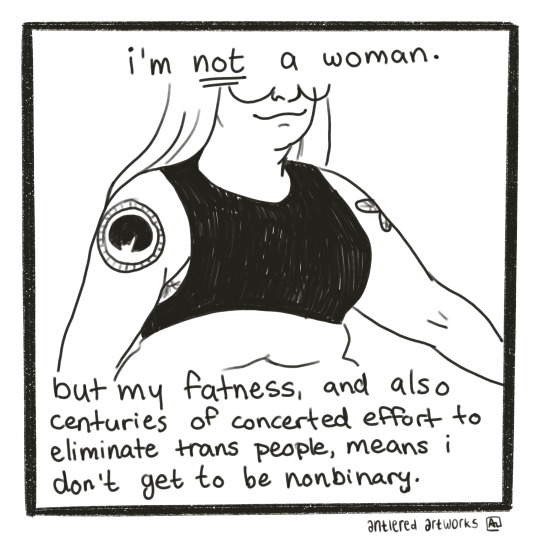

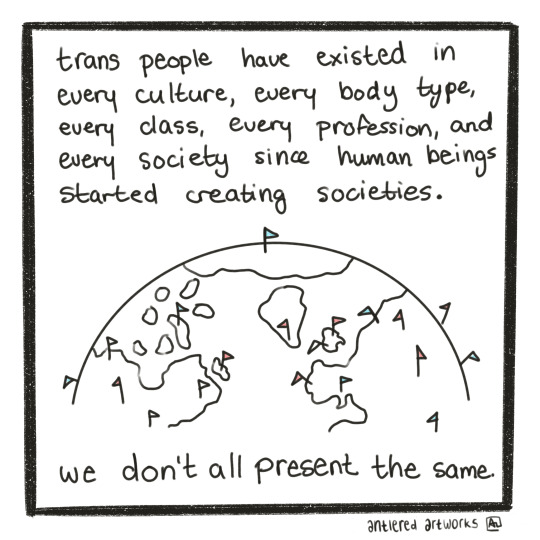
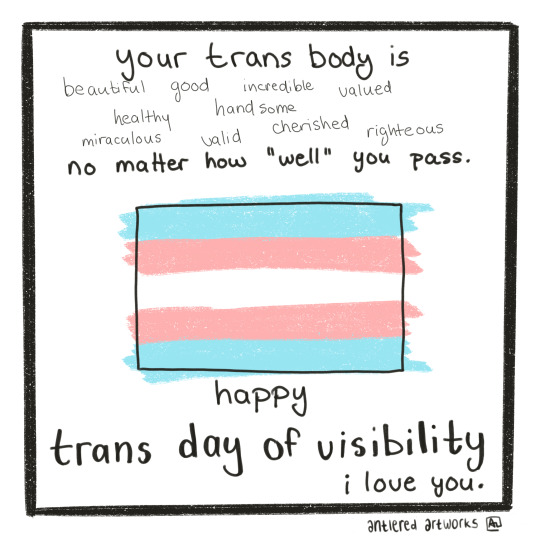
happy tdov my loves. don't let anyone else define your transness for you.
help trans women evacuate gaza
87K notes
·
View notes
Text
Forever fascinated at those feminist* posts that manage to be about 30% trans-supportive, and go:
"People who menstruate are affected by this terrible law, and men will never know how it feels to have their bodies treated as public property like that."
"If you are someone of any gender who has ever had to wear a bra because your breasts were heavy enough to hurt your back, I bet you wish that you could let men feel that pain for even just one day."
And like... They take such a long detour around saying "women" that you think "Oh, they are deliberately being trans inclusive, they're accepting that trans men aren't women and that trans women might not have this common-but-not-universal experience that is often needlessly essentialised to Womanhood when actually it's more about something unrelated." But then they go "MEN" in a way that slams home "Anyone who doesn't have this experience is ACTUALLY A MAN, anyone who has this experience is ACTUALLY A WOMAN, or if they persist in calling themselves men they should be thought of as a perpetrator of this problem rather than someone who experiences it."
2K notes
·
View notes
Text
"Trans as Bodily Becoming" by Riki Lane
If you have access to JSTOR, I highly reccomend you read this article here.
If you're tired of binaries, so is Riki Lane! In this article, they challenge the dichotomy between nature or the body and culture, arguing that these do not have to be kept seperate from each other. We can acknowledge the social construction of gender and the experiences of self-described transsexuals who feel there is a biological impetus behind their transition.
Lane states that "much feminist and queer theory creates a binary opposition that valorizes transgender narratives as subversive, social-constructionist, and challenging gender binaries, while devaluing transexual narratives as conservative, essentialist, biological-determinist, and gender-conformist" (139). In Lane's terminology, "transgender" refers to those who do not feel like there is a biological determinant behind their gender shift, who don't necessarily feel the need to medically transition. "Transexual" refers to the opposite - those who do experience the 'born in the wrong body' narrative, and seek to change that through medical intervention.
In recent years, you may have seen this binary flipped the opposite way - the legitimated, dysphoria-having trangender person, versus the attention-seeking "transtrender". As I was reading, I couldn't help but feel that both ways of viewing this binary completely ignores the whole spectrum between those who may seek no medical transition at all, and those who want every procedure and hormone out there. What about those like myself, who only went on hormones and then quit after a few years? Those who want surgery but no hormones? Any number of combinations are ignored by this dichotomy.
Lane states, "Although there is no way to understand bodies outside of language or discourse, neither are bodies made by language" (142) and "the biological body is no longer passively constructed in discourse - it reacts back, affecting discourse - and we have tools to examine the detail of biological investigations of sex difference in bodies and brains and its application to gender-variant people" (142).
Just as we might wish to break down the mind/body dichotomy, we can also break down the culture/nature dichotomy. When I went on testosterone, that had an affect on how I interacted with the world around me, and how people treated me. The biological change in my body - whether my reasons for creating that biological change were socially constructed or not - changed how I moved through culture.
I think this may have been the missing piece in how I view gender. I have long felt that it is not enough to act as though a persons internal identity is the end-all be-all of their interactions with the world. Whatever words I and those who care for me have used to describe me, my body leaves me in a certain spot. But biology is not destiny - I have the power to change various aspects of my biology, or make it appear as if my biology is changed (even if only hypothetically, due to costs).
Additionally, finding biological precendent for gender-variance does not necessarily spell doom (although I understand many peoples' fears). Biology is diverse and cannot fit into the categories of 'male' and 'female' that we have created - we know this. Lane writes, "Within an interactionist approach many factors produce a continuum of sex and gender effects. It is not additive - x% genes plus y% intra-uterine hormonal experience plus z% early psychosocial experience, but transformative - factors interact in a complex non-linear, ontingent manner to produce unique combinations of sexed bodies and brains, gender identities, and social relations of intersubjective recognition" (148).
In short, the research is telling us the same thing that many of the trans people I know are saying. Our experience cannot fit into some cookie-cutter mold, where we were all "born in the wrong body", or we all made concious gender decisions, or what have you. Each of us is a unique combination of biological and social factors that make up our identity.
3 notes
·
View notes
Text
okay will return to this sincerely later but this discourse about androphobia is....its hitting something. something about our relationship with (specifically white or colonial or militarized) masculinity. there IS a fear of and hatred of masculinity within patriarchy. of specific forms of it. of male self-love and desire outside of a repressed homoerotic drive that keeps men seeking eachother's approval. there's a reification of masculinity in singular acceptable forms. there's hatred of racialized, feminized masculinities but feminized IS a racialized term....there's cultural conflict here bigger than the USAmerican centric trans discourse. a whole vein of analysis. still digging at the corners of it. reading the magnus hirschfeld book. the Will to Change by bell hooks. and the thing that's getting to me is the conflation of nonbinary AFAB people with trans men. and the perspective of intersex advocates who have been ignored in these debates that are centered around perisex folks. so yeah, i'm grateful for everyone who is critiquing the concept of transandrophobia, its refining. because what i truly want to understand is masculinity, my own, cis men's, that of trans men ancestors, to really put it in the full prismatic biological, social, anthropological and ecological perspective. as a settler, i don't think its my place to say "decolonize masculinity" but that's EXACTLY my personal investment. i want us to articulate TRANS DECOLONIAL MASCULINE LIBERATION & LOVE. i want us to have a place, not just an understanding of our oppression or an integration into cis masculine roles (even though that's fine to want for yourself), a sense of brotherhood, personhood, and not only visibility or acceptance, but belonging.
what does it look like for men, for trans men, to belong? to be well and connected to ourselves not only as individuals but important, named parts of a collective? there are languages with words for people like us, not just medical labels, but words of belonging. and we also as a community, an international, multi-lingual community, can do better at listening and creating words for our experiences.
75 notes
·
View notes
Text
A cute guy likes me on a dating app. After chatting with them for weeks, we decide to go on a date. They are very flirtatious and forward over the app, but not when we meet in person. He admits he thought I was transmasc like him, we laugh about it because his mistake is funny and means I'm not passing but in a silly backwards way. I think his sudden awkwardness in person may be nervousness and flirt with him in ways less forward and aggressive than he'd been flirting with me earlier, and they become cold and distant for the rest of the date. By the time I get home they've blocked me on the app we met on. This case of being mistaken as a transmasc on a dating app will happen 3 more times, and in 2/3 times it results in a similar sudden lack of interest where once they were coming on to me. None of these people will be cis.
I am in a self defense class for queer people, learning hand to hand combat as a community. I have been here months. I notice I'm the only transfem in the classes but there are other trans people there so I don't think much of it. Today I have some stubble as I did not have time to shave before the early morning class. When discussing unrealistic action movie and anime fight scenes I describe on of my favorites, quoting the lines as I pantomime the goofy moves. They smile and laugh along until the word bitch leaves my lips in one quote, then the bisexual woman who only ever they/thems me glares at me like I've committed a grevious crime, and the rest of the class looks at me like a freak in awkward silence for a moment before moving on. I learn bitch is not a word a clocky bitch can "reclaim". I am quiet in classes now, and when I go I focus primarily on the training, when I see other trans women try it out they often give me a sad look and do not return for a second class. I get a sinking feeling that if I ever use this training to save my life one day I'd be branded a violent man instead of a strong woman.
I am texting with a good friend of years who was one of the people who helped me realize I was trans like them and even the one who helped pick out my name loves talking about our shared interests and sharing their favorite smut with me. We bond over favorite stories, artists, characters, and kinks as well as our trans experience. Yet they constantly tell me they could never date someone who's AMAB because of the trauma of being "female socialized" and their genital preferences for vulvas. Every compliment they have ever given me on my appearance or outfit is followed up by "but in a non-sexual way, I could never date you". Today I finally have the courage tell them they don't need to say that every time. They ignore this response. We keep talking for awhile, but they start taking months to respond to my messages and respond with a short sentence at most. They no longer share details about their life and shut me out when I ask or share details about mine, even the most mundane and chaste details. I stop talking to them. A birthday gift I bought them months before this falling out happened looms at me in my closet. I cannot use it as it doesn't fit me but can't bring myself to throw it away, just in case we reconcile one day. I feel pathetic for craving friendship with someone who sees me as "abuser-bodied", that so much of my early stages would've been impossible without their help. I feel a little more lost without them.
I am at a queer/trans/enby kink dance party with some friends. I am scantily clad and wearing a skirt and high heeled boots. I do not pass well so this space is one of the few places I feel safe and free dressing like this. It is packed with queer and trans people just like me engaged in delightful debauchery and wearing very little. The music hurts my ears but I'm happy to be here, I feel overstimulated but alive and authentic. I am approached by a beautiful stranger from across the dance floor, she is graceful and stylish, like some modern Galadriel clad in leather, white lace, and industrial piercings with impeccable voice training. She compliments my outfit, I compliment hers. She tells me I need to shave my armpits if I want to look like a real woman. My two friends stand up for me and yell at her. They assure me she was just being an asshole, that women were supposed to be hairy, but I can't help but notice how both of them have hairy armpits and yet the "advice" targeted me. The wide range of bodies that people here tonight find desirable on cis women don't seem to apply to the women like me. I am the only one of us that doesn't go home with a hookup at the end of the night. I realize now she likely spoke from experience. I am still hurt by her words, but realizing the kinds of experiences she must have had herself to feel her words were kind advice hurts far worse.
A local queer photographer who's work I follow is looking for women & non-binary models for a photoshoot. I have become comfortable with getting photos taken of me for the first time in my life since my egg cracked, and had a few small time modeling gigs under my belt. With something like this I could actually have the beginnings of a portfolio. I reach and am told that they are not looking for trans women models, "only women and AFABs". Getting the same line I get from agencies from an independent queer photographer repackaged in "woke" terminology stings. I see many queer and nonbinary models I looked up to take part in the shoot. I have to wonder if they knew that the photographer's definition of woman didn't include trans women, or if like me in my martial arts class they noticed no transfems were there but didn't think much of it because there were other trans people there.
It is years ago and I am still an egg. I am with my partner of 4 years. I am exhausted after a long day. She asks me for sex in the voice that I know means saying no will hurt her. I learned from her long ago men have high and insatiable sex drives, therefore saying no meant I wanted to have sex, just not with her. So I say yes. The sex is painful and unsatisfying, and I simply do my best to thrust through the discomfort until she cums. I feel numb and hurt. She enjoys herself but seems sad I did not cum. I assure her I love her. When we hold eachother after my obligation has been met and I finally feel comfortable and safe. We begin talking. She talks about the trashy women she saw on the street today, describing their cringe outfits and ugly styles and bad hair. All the styles and clothes and hair I yearn to try myself in my deepest and most repressed desires. I change the subject and ask her about work and family. She asks if I'd still love her if she were a man and I say yes. She says she would still love me if I were a woman. Something in that statement feels like a lie. It is months later when we break up and I move out. Now that I am a woman I look back and know from our years together that if I were a woman then she'd hate the kind of woman I'd become. That if I were a woman she'd still have the same expectations of me as a man, that her refusal of sex equated an impersonal not being in the mood but my refusal of sex equated a cruel refusal of love.
A lesbian group begins organizing a queer woman's strip night event. A safe place for amateur performers to shine and women to perform and enjoy sexuality away from the male gaze. I see no transfems in the promotional material or leadership team, and I've learned not to think nothing of it just because there are other trans people there. I do not go.
I am talking with my therapist. They are trans too and an amazing therapist, often providing insights and advice only someone else with the lived experience of being trans can. I express distress and suicidal ideation at the fact I feel like I need to pass before I can dress the way I want. That until I get expensive hair removal procedures and FFS I can never feel safe and welcome presenting authentically. I lament how these things are expensive and may never be accessible to me. They tell me I need to deal with my "internalized transphobia", as if these feelings aren't a result of constant rejection and othering by external forces even within queer spaces. As if the scrap of womanhood others sometimes acknowledge in me does not rely on their perceptions of me.
There is a publication accepting works from trans people of all stripes to document trans experiences. It gets flamed for not having a single transfem as a contributor. The people behind it apologize profusely, they say didn't notice no transfems had sent work in and would do a sequel publication that was transfem-centric. I wonder if anyone had noticed there were no transfems but didn't think much of it because there were other trans people there. I think about the kinds of spaces I've seen like that, and the implications it has about how they treat transfems, and I am unsurprised no transfems submitted.
One of my closest friends for years is very supportive of me when I first begin crossdressing and experimenting with they/them pronouns. She gives me suggestions on cute clothes to wear and takes me shopping as well as asks for pictures. We had helped eachother discover we were both queer as young teens, come to terms with it, and navigate it in a hostile environment, so I have complete trust. We are close enough we are frequently asking eachother advice on serious life choices & relationships, sending nudes for critique + tips before sending them to our partners, and sharing our most secret and vulnerable moments. She often asks me for tips on getting her straight boyfriends into pegging and crossdressing that make me slightly uncomfortable but I don't mind, she is a loyal friend I would endure a great many discomforts for. I host a lunch for us one day, and come out to her as a trans woman. I tell her my new name, say I no longer use he/him pronouns, and thank her for her support on my journey thus far. She launches into a monologue about how by changing my name I am throwing away all our memories together and spitting in the face of my family. Taken aback by her sudden heel turn after being so supportive of me being nonbinary and GNC, I excuse myself to go to the bathroom to get a break and give her some time to process. When I am in the bathroom trying not to cry, she is on the phone. I overhear her misgendering me as she is talking about me being bisexual in a frightened voice. She sounds truly afraid that I intend to be sexually violent towards her. When I leave the bathroom and sit back down I pretend not to have heard. She gets off the phone, saying she was just chatting with her boyfriend. We talk a bit longer, she explains how "the surgery" is dangerous and experimental and she hopes I won't get it. I assure her I won't and do my best to change the subject and hope she comes around after some time to process things, hurt and shocked that what I saw as a natural shift in the path I was already on marked me as frightening in her eyes after knowing eachother for over a decade. That a fellow bisexual suddenly saw my bisexuality as dangerous now that I was asserting myself as a trans woman. I say goodbye to her, and she says goodbye to me using my deadname, I do not risk an argument to correct her. It is months after the meeting we have not seen eachother since and she has not responded to any messages I sent. After reflecting on her reaction further I decide that I don't really want to spend time with someone who thinks these things about me for my own safety and mental health, regardless of our history. A friend of 14 years who supported my queerness and transness gone the instant I crossed an intangible woman-shaped line that marked me as a predator and invader in her eyes.
I log online and day after day see trans women getting banned and harassed. Seeing baseless callout posts calling them groomers and abusers getting taken seriously by other queer and trans people. Seeing proof that deep down so many people I consider kindred spirits see me and people like me as worthy of intense scrutiny and policing to keep "the queer community" safe and united. The blocklist grows but everything stays the same. I treasure the people in my life who don't take part in this and would do anything for them, but it seems they get fewer each time.
I'm not making this post to seek sympathy, I am used to this kind of shit and far worse has happened to myself and others. I just make this to illustrate transmisogyny is not some "online-only" issue like people claim. Even if online issues weren't "real" (as healed is fond of saying, "online is real") this has tangible effects in the way trans women are treated offline as well. By communities, friends, partners, colleagues, systems, etc. That's why we talk about it.
So much of the discussions people have paint transmisogyny as some online oppression olympics maliciously trying to divide the community, smear transmascs, and "reinvent bioessentialism". That is not what it is about. Discussions about transmisogyny is about how we are treated for being what we are, and while related to transphobia and misogyny it is seperate because it often represents doors other trans people and women can walk through that transfems cannot. It has affected me in my most intimate moments when I was with other trans and queer people I felt safe around, and taught me that I need to carefully manage my persona and presentation at all times lest my authenticity be branded "male socialization". I am even terrified to express attraction to people who express attraction towards me because I'm so used to being treated like a predator upon reciprocating or being used and abandoned by people I trusted. I am terrified to be too excited about shared interests with friends lest I be too loud or talkative about it and branded with aggressive male socialization. So I make myself quiet and small, and shrink from the community and people I care about, and become more and more isolated.
Anyways, stop platforming anons who spread lies about trans women, stop hopping on TERF harassment campaigns because the trans gal they're smearing "gave you bad vibes", and maybe consider carefully if in your own life where you draw the line for a transfem's behavior is any different from where you'd draw the line for anyone who's not one.
72K notes
·
View notes
Text
"A Man Trapped in a Woman’s Body.
A Drag Queen Trapped in a Bulldagger’s Body.
A Heterosexual White Man Trapped in a Drag Queen’s Body, Which Is Trapped in a Butch Dyke’s Body. A Cross-Dressing Straight Man Trapped in a Bear Fag’s Body That Is Trapped in a Female-To-Male Transsexual’s Body That Is Trapped in the Body of a OnceHeterosexual-but-Now-Gay Woman.
A Male-Identified Straight Womyn-With-A-Born-WomanWoman Trapped in the Body of a Lesbian Male-To-Female Transgender Woman’s Body. A Soccer Mom Trapped in a Leatherdaddy’s Body. A Dog Trapped in a Human Body. A Trans-Species Cat-To-Dog Trapped in the Body of a Bisexual Man Trapped in the Body of a Fifth Grader from Suburban Massachusetts. A Swimmer Trapped in a Shark’s Body. A Body Trapped in an Idea of a Body. "
Identity Poem From: "Pass with Care: Memoirs" by Cooper Lee Bombardier.
520 notes
·
View notes
Text
the idea that testosterone is a dangerous hormone that inherently makes someone domineering and difficult to be around is transphobic all round, leaning on bioessentialism.
for trans men and transmascs, we are warned against medical transition for fear that we may lose our agreeableness and perceived passivity. we are seen as potential aggressors after going on it.
trans woman and transfems have any testosterone in their system, whether on hrt or not, held over them like an original sin that can not be escaped that positions them as more aggressive and dangerous. it is seen as something that threatens their womanhood and can be brought up against them at any time to revoke it.
testosterone is not an evil hormone. it does not change your moral character. it does good for some and bad for others, like any other hormone.
15K notes
·
View notes
Text
It's really good to see studies like this. Just a simple yet diligent study of "Did HRT help trans people? ...Yes."
28 notes
·
View notes
Text
TME and TMA as intersexist terms: as written by an intersex transfem
I’ve had a few different people in my inbox asking me why I view these terms the way I do. In particular, why I claim it’s intersexist. So, I thought I’d lay out a few examples, so everyone can understand where I’m coming from.
Imagine an intersex woman. She was assigned female at birth by her doctors, and was able to go about her childhood as a woman with no inclination that anything was amiss. Sure, she didn’t experience certain parts of puberty, but puberty was different for everyone, right?
But, later in life, she learns she has Turner syndrome. This is an intersex condition where a woman has only one X chromosome, rather than the usual two.
Soon after she learns this, she finds that laws are being made to attempt to keep trans women out of women’s spaces (often specifically sports) which use chromosomes as a defining factor of womanhood.
Would this intersex person be considered “transmisogyny affected”? She has been raised as a cisgender woman with no problems regarding being ‘clocked’, but she is also a direct target of transmisogynistic laws. She lies in a gray area.
Now, let’s go to another intersex person. Imagine an intersex man with PAIS. AIS is an intersex condition where babies are born with testes and XY chromosomes, but their body is immune to or can’t respond to androgens (which includes testosterone). Intersex people with partial AIS (PAIS) often develop a vulva and clitoris during puberty.
This intersex person identifies as a man, and he was assigned male at birth. However, his body does not produce testosterone, and he went through a feminizing puberty. To the average eye, he appears to be a woman now because of this.
Would this intersex person be considered “transmisogyny affected?” He was assigned male at birth, and now appears to be a woman, much like many transfems. However, if many saw how he looks now, stating that he is a male, they would probably clock him as transmasc. He was raised as a boy until puberty, and then faced astrozcization from his peers when he began a puberty that feminized him. What he was facing was a form of intersexism where transmisogyny was playing a huge part. Does his childhood matter? Can one become TME over time, when they were TMA as a child? Again, he lies in a gray area, where the answer is not quite so simple.
What about the “opposite”, per se — an intersex woman who had a masculinizing puberty? She has aromatase deficiency, which means that many ‘male’ hormones (which would usually be converted to ‘female’ hormones) would remain unconverted. She identifies as a woman, and was identified as a female at birth and was raised, until puberty, as a female. But now, she would be clocked as a trans woman upon looking at her. What does that make her? Is it different from the previous example? How and why? This intersex person also lies in a gray area. How she should be described with these terms is not clear.
And keep in mind, these are all relatively simple examples. All of the examples I listed self-identify as cisgender. But there are intersex people who are trans in any direction you can imagine.
If that last example identified as a trans woman, because she is now clocked as one, would you be able to say she’s wrong for that? What about if she identified as transmasculine, because of her experience with puberty? What if she’s multigender, bigender or genderfluid, and says she’s both transmasc and transfem because of her complicated experiences? Would that make her a TMA transmasculine person? But I thought that transmascs were all TME? That’s how it’s so often framed, anyway.
The reason why these questions are so difficult to answer is because these terms were not made with intersex people in mind. Very real intersex transfems were pushed to the wayside in favor of centering the perisex view of transgenderism. Intersex people are nothing but an inconvenient little afterthought, annoying perisex people with their demand for “inclusion” and “consideration”. (As per usual.)
You cannot simply make a new gender binary and say, “No, really, this time everyone fits into these two categories! Forcing people to confine themselves to these two rigid labels which are shown as opposites, and as never interacting, will definitely include everyone this time!!” No matter what the contents of the new binary is, it’s not going to work, because sex and gender alike are too complicated for that. There will always be people in the gray area.
This isn’t even getting into the fact that these terms, for all intents and purposes, seem to have been popularized by and associated with the Baeddelism movement around 2017, which was essentially “Radical Feminism 2: We’re Trans Women, So It’s Fine!” This movement is known for chronic villainization of trans men and non-binary people who aren’t transfem. (They act like this with cis people too, but noticeably less so than they do with non-transfem trans people. How curious.) Think along the lines of how regular radfems treat all men (and who they deem to be men) as inherently morally disgusting scum who deserve to be attacked.
Methinks that maybe these terms aren’t the neutral, fact-based descriptors of oppression that many people nowadays tout them to be, considering that.
So, yeah. “Transmisogyny exempt” and “transmisogyny affected” as terms: not even once. Listen to intersex people, stop trying to make sex and gender into binaries, and for the love of God, stop drinking the queer seperationist koolaid!
6K notes
·
View notes
Text
Gender Trouble Generative Writing
Reading Gender Trouble, I am overwhelmed by questions. Butler argues that “gender ought not to be sconstrued as a stable identity or locus of agency from which various acts follow; rather, gender is an identity tenuously constituted in time, instituted in an exterior space through a stylized repetition of acts” (191). In other words, gender is not a singular, stabilized notion that is found within ourselves (since interiority is, too, an illusion), but is continually recreated through actions.
Reading this, I wonder: what, in this context, is an action? Surely it is an action to speak, to proclaim “I am xyz”, but is it an action to think, to desire? If a butch ponders the possibility of starting testosterone with no one around to hear it, is that one act in this series of stylized repetitions? Performativity implies an audience - who are we performing for? And furthermore, whose actions have influence?
At the liquor store, between the dark and the bulk of my clothing, the shape of my body cannot be made out, and I know the man swaying outside thinks I’m a teenage boy when he calls out that I’m too young to go into the liquor store. When I go to the post office, the person behind the counter hands me a package, and says “Here you are, sir-ma’am”. A woman at the club shouts “As you should daddy!!” when I, in my frustration, exclaim that fuck it! I’m using the men’s bathroom. As a professor introduces me to a class I’m visiting to advertise for my job, they use she/her pronouns for me.
All of these instances are, of course, the readings people take of my body and of my actions. Testosterone has made my voice deeper, caused sparse and faint (but still there!) facial hair, and now it’s much more common that people perceive me as a man - until they take note of my breasts, anyway, which I have never been successfully able to bind.
Despite these questions, something of me bends towards Butler’s theories. The connection between male/female, culture/nature, mind/body is there, I think, all these ideas leaning on and supporting each other, becoming the fabric that our lives and institutions are built on and that, in turn, build us. I cannot conceive of my body except through the social conceptions that I was born into, and neither can anyone else. My body is constructed as a place of meaning just as much as my language is - and I can hardly blame others for their attempt to “read” this information from my bother, further complicated by the additional information that fashion and action add to the situation.
1 note
·
View note

